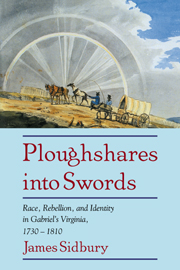Book contents
- Frontmatter
- Contents
- Acknowledgments
- Introduction
- Prologue: From Blacks in Virginia to Black Virginians
- 1 The emergence of racial consciousness in eighteenth-century Virginia
- Part I Cultural process: Creolization, appropriation, and collective identity in Gabriel's Virginia
- Part II Social practice: Urbanization, commercialization, and identity in the daily life of Gabriel's Richmond
- 5 The growth of early Richmond
- 6 Labor, race, and identity in early Richmond
- 7 Race and constructions of gender in early Richmond
- Epilogue: Gabriel and Richmond in historical and fictional time
- Appendix: Richmond households in 1784 and 1810
- Index
6 - Labor, race, and identity in early Richmond
Published online by Cambridge University Press: 04 August 2010
- Frontmatter
- Contents
- Acknowledgments
- Introduction
- Prologue: From Blacks in Virginia to Black Virginians
- 1 The emergence of racial consciousness in eighteenth-century Virginia
- Part I Cultural process: Creolization, appropriation, and collective identity in Gabriel's Virginia
- Part II Social practice: Urbanization, commercialization, and identity in the daily life of Gabriel's Richmond
- 5 The growth of early Richmond
- 6 Labor, race, and identity in early Richmond
- 7 Race and constructions of gender in early Richmond
- Epilogue: Gabriel and Richmond in historical and fictional time
- Appendix: Richmond households in 1784 and 1810
- Index
Summary
Disorderly houses, tippling shops, and gambling houses helped to create an urban environment that troubled many White Virginians, and strict attention to White Virginians' complaints about Richmond can create the impression that the activities that took place in such establishments constituted the heart of the Black experience in the town. Nothing could be further from the truth. Had illicit activities comprised the main occupations of Black Richmonders, then authorities could easily have cracked down on the liberties of the city. Urban centers did not develop in postrevolutionary Virginia in order to provide a safety valve for pent-up Black frustration. Towns grew in response to economic development and the need for more centralized and sophisticated urban services than the planter-merchants who dominated Virginia's commerce during the first half of the eighteenth century could provide. Towns like Richmond required large and flexible labor forces, and Richmond's labor force was largely composed of slaves. Work lay at the core of the Black experience in early Richmond, just as it lay at the core of the Black experience in rural Virginia, but the nature and conditions of urban labor differed from plantation labor in ways that helped to shape Gabriel's world.
Through the first half of the eighteenth century, planter–merchants had presided over great plantations with artisanal workshops manned by skilled slaves, tobacco wharves that served their regions, and stores where neighbors could buy manufactured goods imported from Europe. Planter–merchants also served as community bankers, building up sizable networks of nearby smaller farmers who owed substantial sums and who granted them social and political predominance in return for gentle treatment.
- Type
- Chapter
- Information
- Ploughshares into SwordsRace, Rebellion, and Identity in Gabriel's Virginia, 1730–1810, pp. 184 - 219Publisher: Cambridge University PressPrint publication year: 1997



